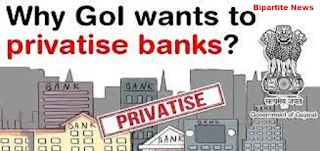Curently privatization of Public Sector bank is the burning topic as far as the current economy is concerned. There are lot of discussion going on regarding the right time for privatization of Public Sector Banks in India.
It is being said that Public Sector banks are lag behind their private sector counterparts in most metrics. But the political will to privatise them is absent. What are the reasons :
1. There is no denying that the pandemic has left deep scars on India’s banking system, and it is highly possible that the imperatives of the pandemic-induced ‘new normal’ will impact and influence the risk-return landscape for most economic and business activities in the years to come.
2. Credit risk in the loan book
The loan portfolios of banks are repositories of 80 per cent or more of their overall risks, reckoned by the regulatory capital required for this purpose. Credit risk exposure-related losses have overwhelmed, especially the public sector banks (PSBs) from time to time, the latest being in the years following the commencement of ‘Asset Quality Review’ in 2014.
Despite this backdrop, a perception has long been created, and particularly in the wake of the Global Financial Crisis (2008-10) that the so-called brick-and-mortar banking involving deposit-mobilisation and loan-making is inherently safe and less risky and any financial innovation such as securitisation and use of derivatives for risk-taking is necessarily bad and unsafe, at best, and reckless speculation, at worst.
3. There has been a slow revival in the credit offtake of banks in 2021, the latest print being a 7.1 per cent y-o-y rise, most of which has been led by the retail side of their business. The pace of growth of retail credit still remains below its pre-Covid level, though.
In fact, the retail-led credit growth model, which has been adopted as a matter of strategy by most large banks in India, is now facing headwinds.
4. On the wholesale side, while lending to the public sector entities is showing a decent rise, growth in credit to non-PSU non-financial entities witnessed a decline overall continuously for almost two years now, with a modest positive growth for AA and above-rated corporates.
5. These developments bode ill for the ability of PSBs to compete on loan price, all else being equal.
Inadequate political capital
There are so many who are advocating that country needs bold policy initiatives to privatise most PSBs within a time-frame. The rationale for doing so is simple and straightforward: a capital-starved country like ours can ill-afford systematic inefficient use of financial savings and of taxpayers’ money that the government uses to recapitalise PSBs.
It is also said that PSBs hold the savings of the common people in trust and, hence, their privatisation would be violative of the social contract that underlie the current arrangement.
Fortunately, the Supreme Court, in a recent order, has declined to accept the trusteeship concept. But the popular perception doggedly refuses to accept the debtor-creditor relationship that exists between a bank and its depositors.
Input through thehindubusiness
Tags:
Privatization
